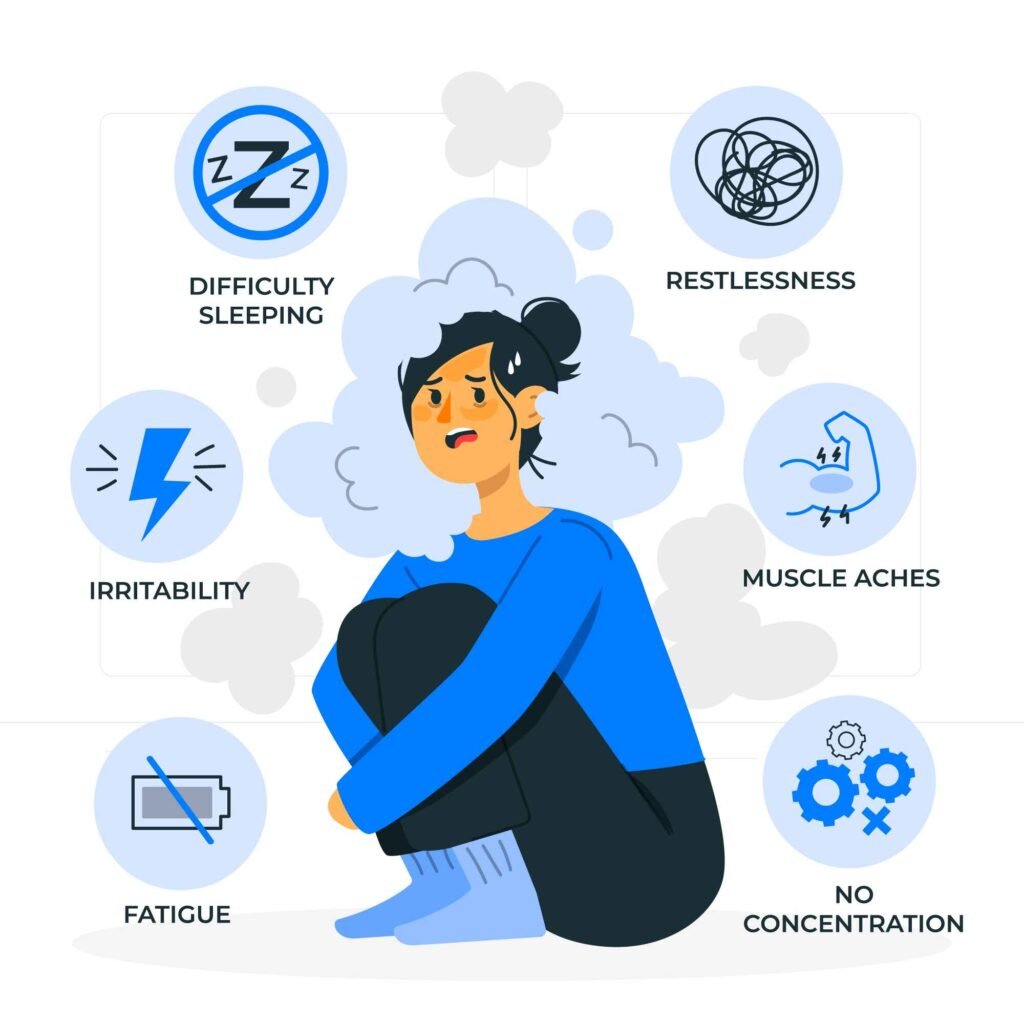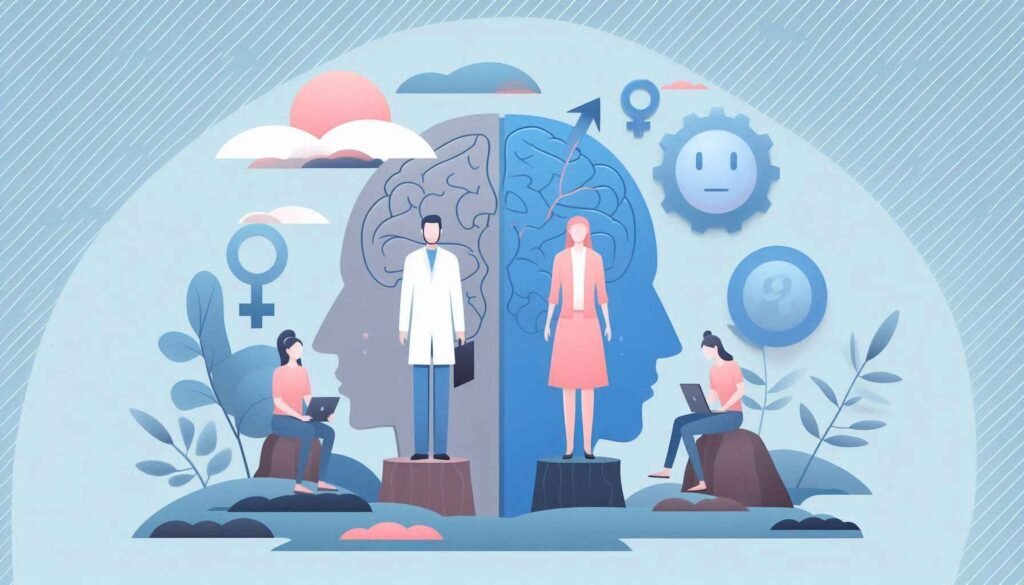
Climate Change and Mental Health
Introduction: The Overlapping Crisis of Climate Change and Mental Health
The effects of climate change are undeniable, from rising temperatures to devastating natural disasters. However, one often overlooked aspect is its impact on mental health. Beyond the physical destruction, climate change is creating a ripple effect on mental well-being, leading to anxiety, depression, and even trauma. As the world grapples with the climate crisis, understanding and addressing its psychological effects becomes essential.
The Psychological Toll of Climate Disasters
Natural disasters like hurricanes, wildfires, and floods are becoming more frequent and intense due to climate change. These events not only destroy homes and livelihoods but also leave deep emotional scars. Survivors often face post-traumatic stress disorder (PTSD), anxiety, and depression.
Trauma and PTSD: The Long-Lasting Effects
Experiencing or witnessing catastrophic events leaves a lasting impact on individuals. The fear of recurrence can lead to chronic stress and PTSD. Communities that are repeatedly exposed to these events, such as coastal towns prone to hurricanes, are at a higher risk of collective trauma.
Economic Stress Amplifies Mental Strain
The economic losses caused by climate disasters further exacerbate mental health issues. Families struggling to rebuild their lives after losing homes or jobs often face increased anxiety, leading to higher levels of depression and stress-related disorders.
Eco-Anxiety: A Rising Concern
Eco-anxiety refers to the chronic fear of environmental doom. This phenomenon, particularly prevalent among younger generations, arises from feelings of helplessness and despair about the planet’s future.
Youth and Climate Despair
Young people, acutely aware of climate change’s long-term impacts, often feel overwhelmed. They worry about what the world will look like in the coming decades and whether their actions can make a meaningful difference. This anxiety can lead to feelings of hopelessness and a decline in overall mental health.
Social Media and Climate Awareness
While social media raises awareness about climate change, it also amplifies eco-anxiety. Constant exposure to alarming news about environmental degradation can leave individuals feeling powerless and stressed.
Climate Migration and Mental Health Challenges
The growing phenomenon of climate migration—where individuals are forced to leave their homes due to environmental changes—poses unique mental health challenges.
The Trauma of Displacement
Leaving one’s home due to uninhabitable conditions is a traumatic experience. Climate migrants often face uncertainty, loss of identity, and social isolation, all of which contribute to mental health issues like depression and anxiety.
Cultural and Social Disruption
Migrants face the additional burden of integrating into new communities while dealing with the loss of familiar environments. This disruption can lead to increased feelings of alienation and stress.
Strategies to Address the Mental Health Impact of Climate Change
While climate change continues to affect mental health globally, there are actionable steps to mitigate these effects.
Building Resilient Communities
Strengthening community support systems can help individuals cope better with climate-related stress. Initiatives that promote social connections and offer psychological first aid can provide much-needed relief.
Promoting Eco-Therapy
Eco-therapy, which involves reconnecting with nature, can be a powerful tool for managing eco-anxiety. Activities like gardening, nature walks, and conservation projects help individuals feel a sense of purpose and control over their environmental impact.
Raising Awareness and Advocacy
Educating the public about the mental health effects of climate change is crucial. Advocacy efforts should focus on integrating mental health services into disaster response plans to provide timely support for affected individuals.
How Climate Change Impacts Different Mental Health Disorders
Anxiety Disorders and Uncertainty About the Future
Climate change introduces a pervasive sense of uncertainty, which fuels anxiety disorders. People are increasingly concerned about unpredictable weather patterns, the safety of their homes, and the future of their children. This persistent worry can evolve into generalized anxiety disorder (GAD), where fears about climate-related threats infiltrate everyday thoughts.
Climate Change and Panic Attacks
Those prone to panic attacks may find that climate-related news or events trigger episodes of overwhelming fear. Sudden changes in weather, news about disasters, or even personal experiences with climate events can heighten the frequency and severity of panic attacks.
Coping Mechanisms for Anxiety
- Mindfulness and Meditation: Practicing mindfulness helps individuals stay grounded, even when thoughts about the future spiral.
- Limiting News Consumption: Taking breaks from distressing climate news can reduce anxiety levels.
- Community Support Groups: Connecting with others who share similar concerns fosters resilience and shared coping strategies.
Depression and Feelings of Hopelessness
Climate change can also deepen feelings of hopelessness and despair, leading to clinical depression. The magnitude of the crisis and a sense of powerlessness can overwhelm even the most resilient individuals.
Depression in Vulnerable Communities
Marginalized communities, who often bear the brunt of climate impacts, experience higher rates of depression. The lack of resources, combined with the loss of homes, jobs, and livelihoods, makes recovery from these challenges more difficult.
Strategies to Combat Climate-Induced Depression
- Engaging in Climate Action: Taking steps to combat climate change, such as participating in community initiatives, can instill a sense of purpose.
- Seeking Professional Support: Therapists trained in eco-therapy or trauma counseling can offer valuable coping strategies.
- Physical Activity and Outdoor Time: Exercise, particularly in natural environments, helps reduce depressive symptoms by boosting endorphins.
PTSD and Repeated Exposure to Climate Disasters
People who experience repeated natural disasters are at high risk of developing post-traumatic stress disorder (PTSD). The fear, panic, and trauma of surviving events like hurricanes, wildfires, and floods can lead to symptoms such as flashbacks, nightmares, and emotional numbness.
Climate Refugees and PTSD
Displaced individuals, or climate refugees, often experience PTSD due to the trauma of losing their homes and livelihoods. The journey to new, unfamiliar environments adds additional stress and uncertainty.
Healing from PTSD
- Trauma-Focused Therapy: Treatments like cognitive behavioral therapy (CBT) and eye movement desensitization and reprocessing (EMDR) can alleviate PTSD symptoms.
- Support Networks: Building strong community bonds helps individuals process their trauma through shared experiences.
- Stable Environments: Providing displaced people with stable housing and supportive resources is critical for long-term mental health recovery.
Climate Change and Its Effect on Children’s Mental Health
Rising Anxiety Levels in Young People
Children and teenagers are particularly vulnerable to the mental health impacts of climate change. With constant exposure to climate-related news, young people experience heightened levels of anxiety, commonly referred to as “eco-anxiety.”
Signs of Eco-Anxiety in Children
- Frequent worrying about the environment.
- Feelings of helplessness or sadness when discussing climate issues.
- Nightmares or difficulty sleeping due to environmental fears.
Helping Children Cope with Climate Anxiety
- Open Discussions: Encourage honest conversations about climate change, emphasizing actions they can take to help.
- Positive Stories: Share stories of environmental recovery and sustainability efforts to inspire hope.
- Empowerment Through Action: Involving children in local eco-projects or nature conservation helps them feel more in control.
The Impact of Climate Change on Adolescents
Adolescents are navigating crucial developmental years while also processing the weight of a changing world. The combination of academic stress, social pressures, and climate anxiety can be overwhelming.
Mental Health Risks for Teens
- Increased Depression: Teens aware of the severity of climate change may feel discouraged about their future, leading to depressive symptoms.
- Social Isolation: Teens who are deeply concerned about climate change might feel misunderstood, leading to isolation from peers who don’t share their concerns.
Supporting Adolescents’ Mental Health
- Climate Education: Schools can provide balanced education about climate change, focusing on solutions and resilience.
- Mental Health Resources: Providing access to counselors who understand eco-anxiety can help teens manage their emotions.
- Peer Support Groups: Connecting with like-minded peers helps teens feel less alone in their concerns.
Climate Change, Mental Health, and the Elderly
Increased Vulnerability to Mental Health Struggles
Older adults are especially vulnerable to the mental health effects of climate change due to physical limitations and greater susceptibility to extreme temperatures. They may also experience grief over the loss of familiar environments or communities.
Isolation and Mental Health Risks
Climate-related events can increase isolation among seniors, particularly if transportation becomes limited or infrastructure is damaged. This isolation can lead to depression, loneliness, and cognitive decline.
Building Support for Seniors
- Community-Based Programs: Ensuring that seniors remain connected through social programs helps reduce feelings of isolation.
- Climate-Resilient Infrastructure: Creating homes and facilities that can withstand extreme weather helps protect seniors’ physical and mental well-being.
The Role of Mental Health Services in Climate Adaptation
Integrating Mental Health into Climate Policies
Addressing the mental health impacts of climate change should be part of broader climate adaptation strategies. Policymakers must prioritize mental health services in regions affected by climate-related disasters.
Why Mental Health Matters in Climate Response
- Faster Recovery: Providing mental health support helps communities recover more quickly after disasters.
- Building Resilience: Mental health resources help individuals cope with ongoing stress, promoting long-term resilience.
Steps Policymakers Can Take
- Mental Health Training: Equip first responders and healthcare workers with the tools to address climate-related mental health issues.
- Community-Based Mental Health Services: Invest in accessible mental health services that cater to vulnerable populations.
Climate Change and Mental Health: Building a Resilient Future
The Importance of Resilience in a Changing Climate
Resilience is the ability to adapt and recover from challenges, and in the context of climate change, this quality is essential for protecting mental health. Building resilience helps individuals, communities, and societies respond effectively to environmental stressors and the psychological challenges they bring.
What Does Resilience Look Like?
Resilient individuals:
- Have strong coping mechanisms for managing stress and anxiety.
- Engage in proactive behaviors to address climate concerns.
- Maintain hope and optimism despite challenges.
Communities that prioritize resilience invest in mental health resources, disaster preparedness, and environmental sustainability.
Strategies for Personal Resilience Amid Climate Change
1. Stay Informed Without Feeling Overwhelmed
Knowledge is power, but too much exposure to climate news can increase anxiety. Find a balance between staying informed and protecting your mental well-being.
- Set Limits on News Consumption: Allocate specific times for reading or watching news, and avoid consuming distressing content before bed.
- Choose Trusted Sources: Rely on accurate, science-based information to avoid misinformation.
- Focus on Solutions: Seek out stories of innovation, progress, and successful climate actions to counterbalance negative news.
2. Practice Self-Care and Mindfulness
Prioritizing self-care helps you manage the mental strain caused by climate concerns.
- Mindfulness Meditation: Practices like deep breathing, yoga, and meditation can calm your mind and reduce anxiety.
- Exercise Regularly: Physical activity releases endorphins and helps combat stress.
- Nature Connection: Spend time outdoors to nurture a positive relationship with the environment. Activities like forest bathing, hiking, or gardening can be therapeutic.
3. Engage in Climate Action
Taking action gives you a sense of agency and purpose, reducing feelings of helplessness.
- Individual Actions: Reduce your carbon footprint through simple changes like conserving energy, reducing waste, and using sustainable transportation.
- Community Involvement: Join local environmental groups, participate in clean-up drives, or volunteer for climate-related initiatives.
- Advocacy and Activism: Use your voice to advocate for climate policies and initiatives that support both environmental and mental health.
Community-Based Approaches to Climate Resilience
1. Creating Safe Spaces for Climate Conversations
Communities can provide supportive environments where individuals can openly discuss their climate-related fears and concerns. Climate cafes, support groups, and discussion circles can foster understanding and solidarity.
Benefits of Community Dialogue
- Emotional Support: Knowing others share your concerns reduces feelings of isolation.
- Shared Strategies: Communities can develop collective coping strategies to manage eco-anxiety and climate-related stress.
- Action Planning: Brainstorming solutions and community projects empowers individuals to take action together.
2. Disaster Preparedness and Mental Health Services
Preparing for climate-related disasters is critical for reducing the psychological impact when emergencies occur.
Key Preparedness Steps
- Emergency Plans: Ensure families and communities have clear plans for evacuation, communication, and basic needs during a disaster.
- Mental Health First Aid: Train community members to provide psychological first aid in the aftermath of climate disasters.
- Accessible Resources: Offer mental health services and resources that are easy to access during times of crisis.
3. Building Climate-Resilient Infrastructure
Investing in sustainable, climate-resilient infrastructure helps communities feel safer and more secure.
- Green Spaces: Parks, gardens, and urban green spaces promote mental well-being and improve air quality.
- Flood Defenses: Implementing flood defenses and other protective measures reduces the stress and fear associated with natural disasters.
- Renewable Energy Projects: Community-led renewable energy initiatives foster empowerment and reduce reliance on harmful fossil fuels.
The Role of Policy in Protecting Mental Health
Integrating Mental Health into Climate Policies
Policymakers play a crucial role in addressing the mental health impact of climate change. By recognizing this connection, governments can create policies that support psychological resilience.
Key Policy Recommendations
- Mental Health Services in Disaster Response Plans: Ensure that mental health care is included in all emergency preparedness and response strategies.
- Climate Education Programs: Incorporate climate literacy and mental health education in schools to help children and teens develop resilience.
- Support for Vulnerable Populations: Provide targeted mental health services for marginalized groups, who are disproportionately affected by climate change.
Funding Mental Health Initiatives
Investing in mental health programs that address climate-related issues can yield long-term benefits. Governments should allocate funds for:
- Community Mental Health Centers: Accessible centers where people can receive counseling and support.
- Research and Data Collection: Studies to understand the full scope of climate change’s impact on mental health and identify effective solutions.
- Training Programs: Educating mental health professionals to address climate-related stress and trauma.
The Role of Businesses in Climate and Mental Health
Corporate Responsibility and Mental Health Support
Businesses can contribute to climate resilience by supporting both the environment and their employees’ mental well-being.
Sustainable Business Practices
- Reducing Carbon Footprints: Companies that adopt eco-friendly policies not only help the planet but also reassure employees who care about sustainability.
- Employee Mental Health Programs: Offering counseling services, wellness programs, and stress management workshops helps employees cope with eco-anxiety.
Eco-Friendly Workplaces
Creating green, sustainable work environments improves employee well-being. Features like natural lighting, indoor plants, and energy-efficient buildings can reduce stress and promote productivity.
The Power of Hope and Collective Action
Finding Hope in a Changing World
Despite the challenges posed by climate change, hope remains a powerful antidote to despair. Collective action, innovative solutions, and a growing global movement for climate justice inspire optimism for the future.
Why Hope Matters
- Motivation for Action: Hope motivates individuals to continue fighting for a sustainable future.
- Mental Health Benefits: Maintaining hope reduces anxiety, depression, and feelings of helplessness.
- Resilience Building: Communities that foster hope are more resilient in the face of adversity.
Celebrating Progress and Success Stories
Highlighting progress, such as advancements in renewable energy, successful reforestation projects, and international climate agreements, reinforces the belief that positive change is possible.



